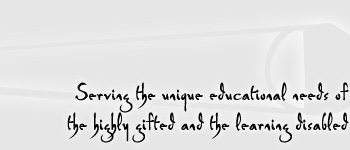














Assessment FAQ
What is your philosophy?
Why might I want an assessment?
How will the results be presented?
But I don't like the whole idea of labelling...
Which tests do you use?
Iím worried that the process will be unpleasant.
How much does it cost?
Other questions?
What is your philosophy?
Good assessment always starts with well-formed questions. I will help you think through what it is that you really want to know about your child or yourself. Then, we can think about what kinds of testing or other observation would be helpful in figuring it out. The process is a lot like science: we generate hypotheses that might explain what we already know, and then we think about what kinds of controlled observations might help us distinguish between different hypotheses. Sometimes, as we refine the questions, we'll find that formal assessment isn't really the right way to answer them, saving you time and money.
Testing cannot tell us about some hypothetical magic number tattooed in a kidís DNA. Although real differences between children absolutely exist, what testing shows us is a snapshot in time: how this person did on this test on that day. Particularly for the unusual folks I typically assess, the scores are only part of the analysis. I am looking not just at what the final numbers were, but also at how the person got there: how they approach different kinds of tasks, what kinds of strategies and skills they use spontaneously, how those skills might compare with classroom expectations, what they do when things are too easy or too hard, and so on. That information is an important adjunct to the numerical scores, because it helps put everything in real-world context.
I believe that it is important to tap into your own knowledge of yourself, both what you are aware of and what we can bring to conscious awareness through the assessment process. Using a therapeutic assessment framework, we work together to share exploration, understanding, and interpretation. Even children can meaningfully engage in the process, and can have the results explained to them in developmentally appropriate ways. Assessment is not something I do to you, but with.
Why might I want an assessment?
Usually, people who seek me out for assessment are asking one of three major types of questions:
- You have a child who is obviously bright. They might have hit a number of developmental milestones early, or taught themselves to read at a young age, or in some other way seem to be highly intelligent. You're gifted yourself, and you know that these things tend to run in families. There might not really be a problem right now, but you're curious, or you're hoping to avoid a problem in the future. You might be trying to figure out what your child's strengths and weaknesses are, and what kinds of educational approaches would be most appropriate; or you might be hoping to get hard data that might qualify the child for some kind of services, or that will inform your discussions with someone else, such as a teacher or administrator.
- A child, adolescent, or adult constantly seems to draw the question, "You're so smart, so why can't you...?" Many bright-to-gifted individuals with "stealth disabilities", including dyslexia, ADHD, Asperger's, anxiety disorders, depression, and the like, are able to manage reasonably well in school, particularly in the younger grades, but struggle more and more as the curricular and organizational demands of school build up. Motivation often suffers. Or they might continue to try harder and harder, but experience less and less success and joy in learning. Parents, teachers, students, and professors might be starting to argue over the meaning of what they are observing -- is the kid just "not that smart," or just "not working hard enough," are the parents just "too pushy," are the educators just "not getting it"? Would formal accommodations, curricular modifications, or special education strategies be appropriate? Could the student learn some new study strategies that might make the difference? Would psychotherapy be helpful? Assessment can help us figure out what is really going on and what could be done about it. Sometimes, what we find surprises everyone.
- An adult has always felt in some way "different" or "unsettled," often struggling to "fit in." You might have looked like one of the previous two types of assessment clients when you were younger, and you might or might not have been formally assessed at the time. But at this point, the question is typically more about, "Who am I, how do I make sense of my life, why am I stuck, and how can I move forward?" If you are currently in therapy, thinking about getting started, or would prefer the brief consultative structure of an assessment, therapeutic assessment can be a way of answering complicated questions in a relatively short time frame.
How will the results be presented?
I will provide you with a comprehensive report, written in readable, nontechnical language, that answers your questions as clearly and completely as possible. My clients tend to be educated adults who are curious not just about the scores, but in gaining a more complete understanding of their childís or their own psychological and learning profile. I include information about how the individual approached different kinds of tasks, what seemed to work well for them, what they might benefit from learning, how they can capitalize on their strengths and shore up their weaknesses, and what real-world teaching or therapeutic methods would be most likely to help. You will also have a chance to sit down with me in person and go over the report, so that I can address any questions you might have.
It is also possible that you might be interested in sharing what we find with a school, an organization that provides services for gifted children, a university disability office, or someone else. I will make sure to present information in a form that will answer the questions those audiences have; if appropriate, I will consult with them ahead of time to ensure that their questions will be fully addressed.
We may decide together that you may also have an audience who needs only the most important ideas from the main report, presented in a short precis that they can read and understand quickly.
Furthermore, many kids, particularly older children and adolescents, benefit strongly from having developmentally-appropriate aspects of the assessment results presented in language they can understand, in a letter or a face-to-face discussion. (Having taught middle school really helps me here.)
But I don't like the whole idea of labelling...
The fact is, people get labelled all the time. Unfortunately, the labels tend to be things like "show-off," "lazy," "unmotivated," "pain in the neck," "not a team player," and so on. The purpose of assessment is to help us ensure that the descriptive language that we use is accurate and compassionate, and that it helps us know what to do in order to support the client's growth. Although formal identification and diagnosis is at times important for certain audiences, I focus on formulation, a more integrated, thorough, and clear way to "tell the story" of a person and what their world is like. The stories are rarely as simple as a label; rather, there is often a complex net of intertwined causal arrows.
Which tests do you use?
I have a wide variety of tests at my disposal. Some of them ďlook like school,Ē while others are used to break down learning and cognition into component parts that can be looked at individually. Some are more open-ended explorations, where we're looing more at your emotional experience and there are no "wrong" answers. I focus the testing on the specific questions weíre asking and our hypotheses about what the answers might be. I will often adapt my testing plan on the fly, based upon what I observe during the testing process.
Iím worried that the process will be unpleasant.
Actually, although most folks are a bit apprehensive before we get started, they generally find that it ends up being interesting, and even fun. It's a bit like detective work -- I feel strongly that we get the most useful information when I can engage the client directly in a collaborative process. Part of my job is to build rapport, and part of what I'm observing is how the client adjusts to the parts of the process that are less than fun. When I'm working with kids, I explain it to them in developmentally-appropriate language. I do generally use the word "test," but I help them understand that these tests are not like the tests in school, in that you cannot fail them: our goal is to find some tasks that are too easy, some that are too hard, and some that are just right. I am also always happy to answer questions before, during, or after testing, and to listen to the client's own insights into the process.
How much does it cost?
That really depends upon the complexity of the question. Once we figure out what your questions are and develop a rough sense of the testing plan, I will quote you a flat fee for the entire assessment process, including my history-taking and other information-gathering, review of work samples, the testing itself, analysis and preparation of the report, and a consultation with you once the report is complete. If appropriate, I might give you some different options and a sense of the pros and cons of each one. In any case, you will know how much you are going to pay before we begin.
If what you need is just a score, and you are not interested in the rest of the analysis and recommendations, you can probably have the testing done more cheaply in other venues, and I wonít be shy about telling you that. In fact, a sizable fraction of parents who contact me seeking assessment hear that I donít think their child needs assessment at all at that time.
Other questions?
If you have any other questions about the assessment process, please don't hesitate to contact me.

 |
 |
 |
 |